SEO
What Do SEO Agencies Do? (And Tips for Choosing One)
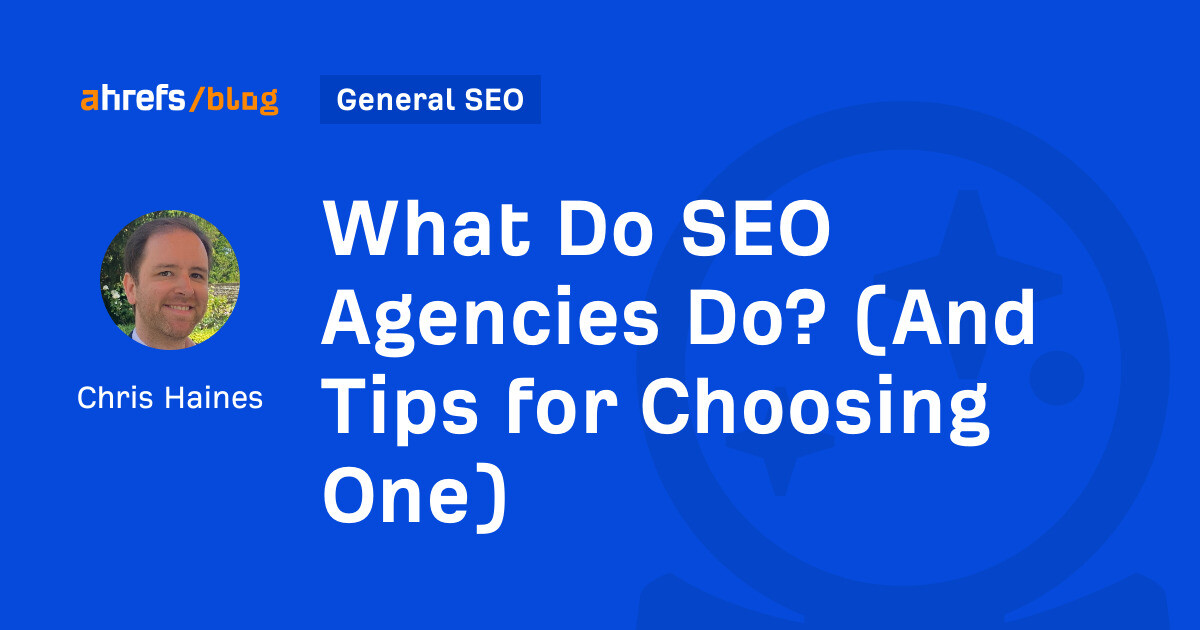
I’ve worked in SEO agencies for the past 10 years. During that time, I have become familiar with how they operate. If you’re looking for the inside scoop on what SEO agencies do, keep scrolling down to find out.
Let’s get started.
The main service an SEO agency will provide is improving your website’s visibility on the search engine results pages (SERPs).
More search visibility means more organic traffic will be driven to your website, sending more leads or customers to your business.
Services supplied by different agencies vary, but your agency should be able to deliver the following core SEO services for your business.
| Service | Why you need it |
|---|---|
| Keyword Research | Targeting the right keywords is a fundamental part of SEO and separates the winners from the losers. |
| Link Acquisition | Links are still a ranking factor in Google. So unless you are a big brand, you will need to acquire links to build authority to your website. |
| SEO Reporting | Reporting enables you to see how your website is performing against your KPIs. |
| Content Creation | Consistently publishing content keeps customers engaged with your brand. |
| Technical SEO | Even if you have a development team, it pays to have a technical SEO expert diagnose any SEO issues with your website. |
Let’s explore these services in more detail.
Keyword research
Keyword research is a common starting point for most SEO campaigns.
The agency will use this research to discover what keywords it needs to focus on to improve your website’s search visibility.
Once your agency has completed the keyword research stage, it will usually present its findings to you.
This may come with a lot of SEO jargon, but don’t worry—I’ve translated some phrases you may hear below:
- Search Volume – This refers to the average number of times a user searches for a query in Google each month. Often abbreviated to “SV” or “MSV” (monthly search volume).
- Keyword Difficulty – How difficult it is to appear in Google for the keyword.
- Keyword Ranking – The position within Google of a particular keyword.
If you were thinking, “I could do this keyword research myself,” then you would be right.
You can.
Simply type a domain into Ahrefs’ Site Explorer and check the Organic keywords report.
Let’s try this with ahrefs.com.
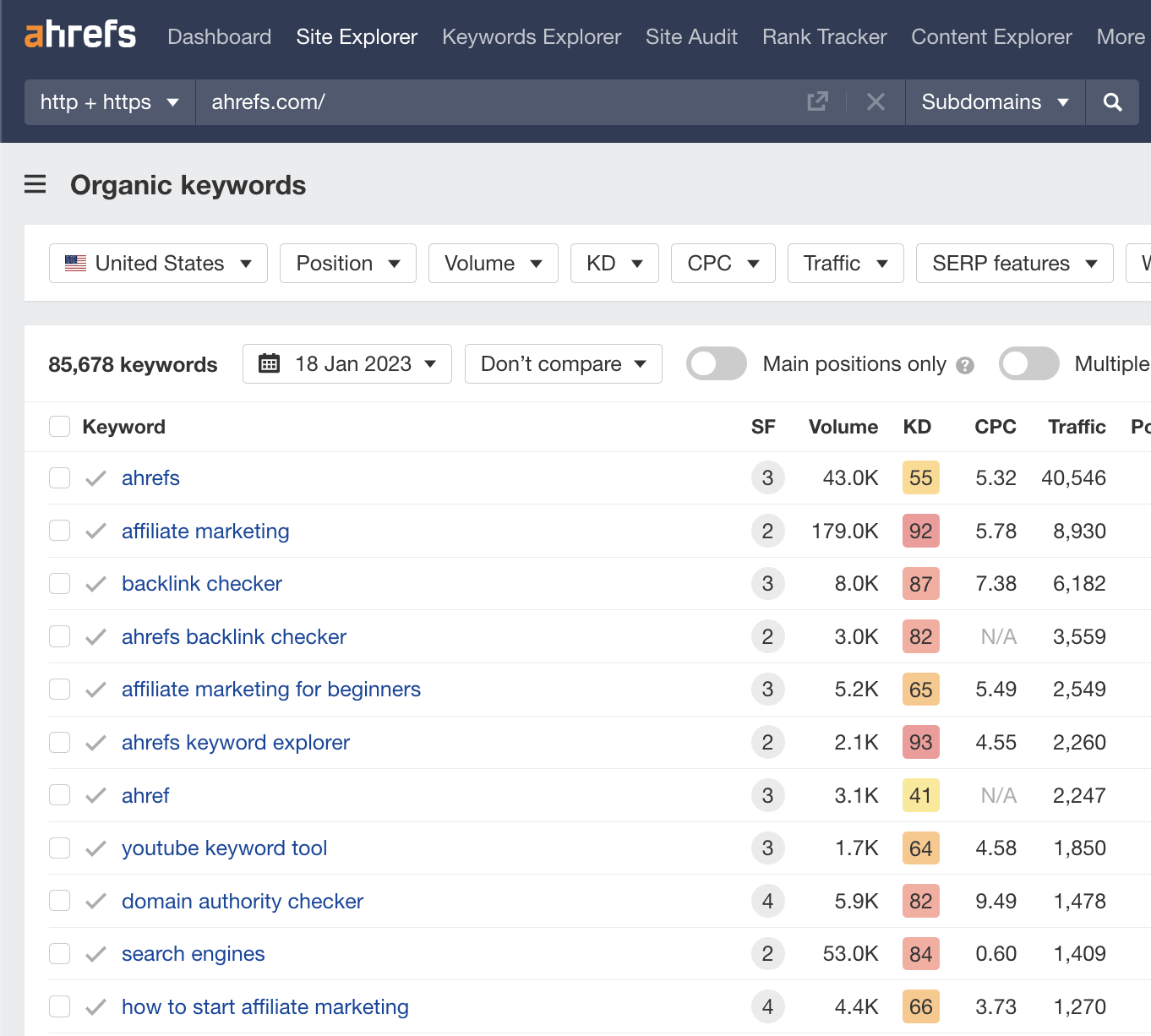
By entering our domain, we can see that Ahrefs already ranks for 85,678 keywords.
Clicking on the Competing domains tab, we get a list of our top competitors.
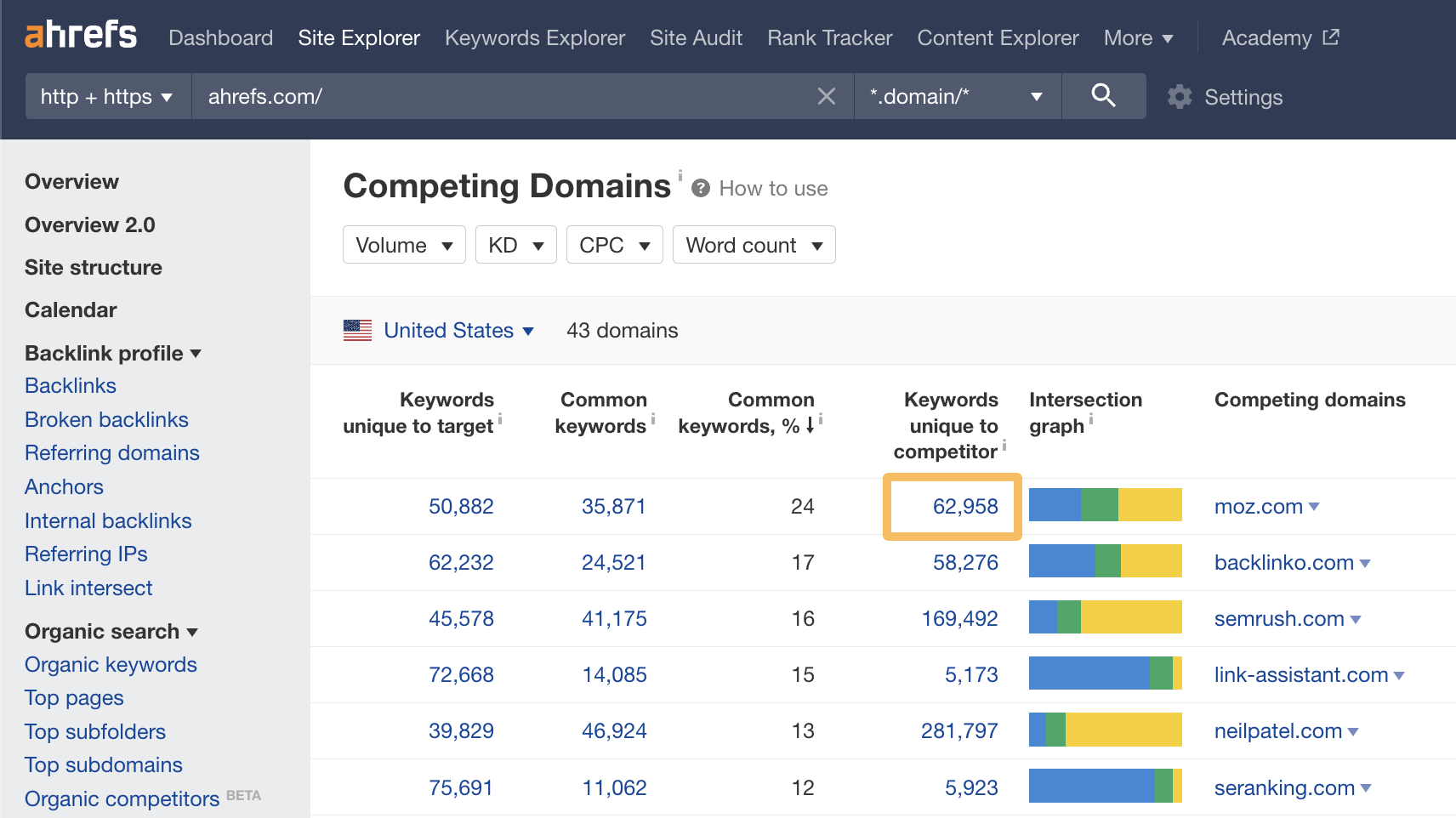
If we look at the first row and click on the keywords unique to our competitor, we can get an idea of what keywords our competitor—in this case, Moz, ranks for.
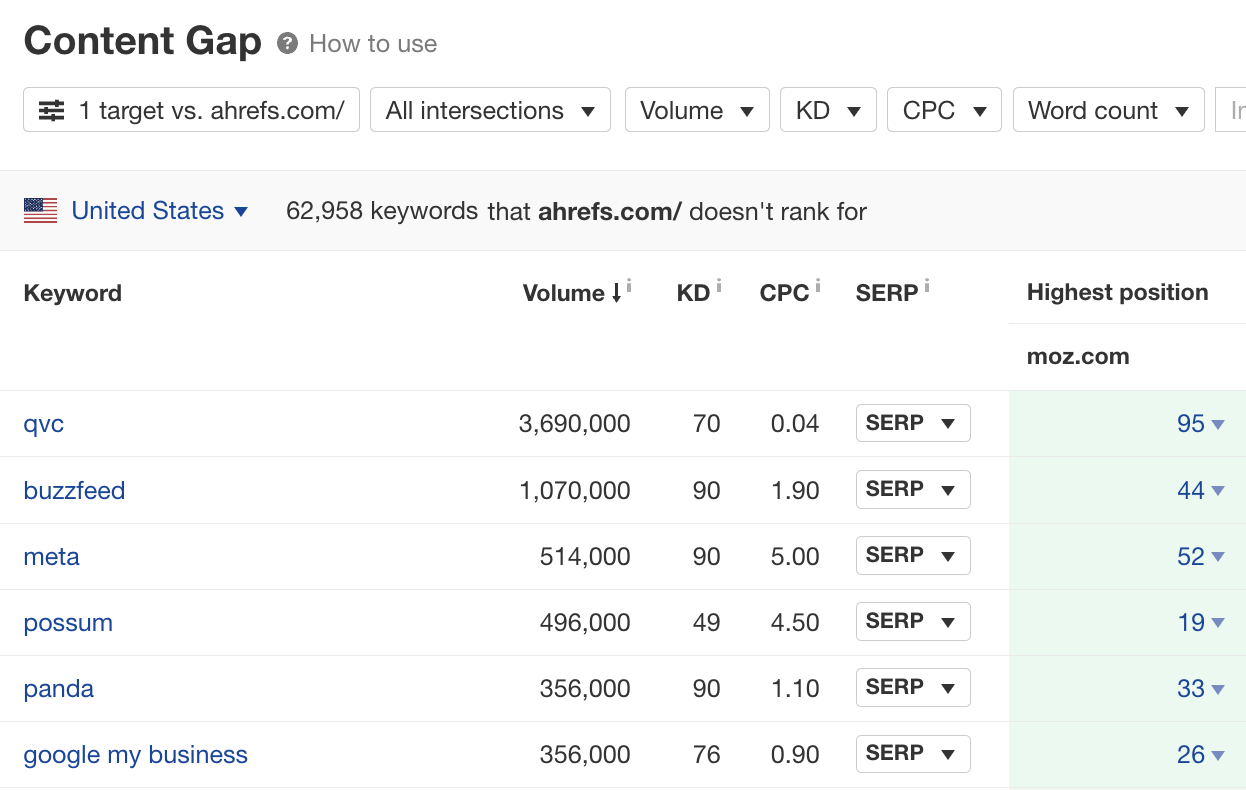
From this, we have 62,958 keywords we can potentially target that our competitor ranks for, but Ahrefs doesn’t.
We can use this process on all our competitors’ sites, allowing us to form the basis of a keyword research document.
The keyword research process isn’t technically difficult— but the interpretation of the data is where you get the value from your SEO agency.
The agency’s experience across multiple verticals and business sectors means it is well positioned to advise you on your keyword strategy.
Link acquisition
Acquiring links is one of the most important activities in SEO. You need to have links to rank in Google. And yes, it’s still one of the most important confirmed Google ranking factors.
Agencies use different tools to identify link prospects, assess their authority, and contact other websites on your behalf.
For example, they may use a tool like Ahrefs’ Site Explorer to understand the authority of any link.
Their exact methods for acquiring links will depend on your website and its assets, but some agencies will propose to make a piece of content that they think will attract links naturally.
Sometimes, agencies will also work in tandem with digital PR teams or directly contact journalists and websites.
In my experience, digital PR teams are best at landing the big links, but they need the support of the SEO team to help manage the overall process.
When it comes to link building, there is a lot of associated jargon. You may hear your agency use the following terms:
- Follow/Dofollow Links – These links can influence page rankings with the search engine results.
- Nofollow Links – These links do not influence the search engine rankings of the destination URL.
- Domain Rating (DR) – An SEO metric developed by Ahrefs that looks at the quality and quantity of the backlinks to a website and scores them on a scale from 0 to 100.
- Link Profile – Assessment of all of the links that a website has.
The jargon around links doesn’t stop there, unfortunately. But if you want to get more translations, you can check out our SEO glossary.
SEO reporting
Plot spoiler: SEO agencies love documentation.
When you work with an agency, it will send you decks, spreadsheets, and many other documents.
The documentation acts as the agency’s paper trail and shows that it is delivering the work to you.
Roadmaps
As well as supplying the core services, an SEO agency will provide you with a detailed roadmap when you start working together.
- This will indicate what areas of SEO it will be focusing on, typically for the next three to six months.
- A good roadmap will prioritize resolving any technical issues first and then devote time to the other elements afterward. The reason for this is that if a website has a significant technical issue, no amount of content will be able to change that.
Kick-off calls and weekly catchups
After you have received the SEO campaign roadmap, you will likely be invited to a “kick-off call,” and the agency will run through the SEO roadmap with you.
This is your chance to confirm that you are happy with the campaign’s focus and confirm, or set, your key performance indicators (KPIs).
Following the kick-off call, you’ll typically have weekly catchup calls with the SEO team.
You will often be given access to an SEO performance dashboard and informed when your monthly report is delivered, allowing you to track the campaign’s performance.
Monthly SEO reports
Providing SEO reports is a big focus for any agency. It is its way of communicating what happened in your SEO campaign, why it happened, and the next steps.
Most agencies will supply at least a monthly report, but other agencies have been known to do weekly or even daily reports.
SEO reporting makes the agency accountable and allows your business to show the wins and losses internally to key stakeholders with ease—by sharing the deck.
Content creation
SEO agencies will create any type of content for your website that you require. The main types of content they will help you with include but are not limited to:
- Blog post content.
- Landing page content.
- Meta descriptions and page titles.
Let’s take a close look at these types of content:
Blog post content
- The agency should deliver a content calendar when you start working with it. This will be your plan for the next few months in terms of blog post content.
- Most agencies will have someone in-house or work with an outsourced content writer to produce your content.
- The agency will typically recommend how many posts it thinks will be necessary per month—this is largely dependent on your budget.
- The agency will usually upload and format the content itself if you have given it access to the CMS.
Landing page content
- With landing page content, an agency will provide recommendations on what it thinks is the best approach to take.
- It will write the content, and it will be written in-house or with a trusted outsourced partner.
- The agency should be able to upload the content itself if it has CMS access.
Meta descriptions and page title content
- When it comes to meta descriptions and page titles, these will most likely be automatically generated using formulas if you have a big website.
- The agency should be able to upload the content itself if it has CMS access.
Technical SEO
Good technical SEO skills are arguably the most lucrative skill set you can have in SEO.
When you approach an SEO agency, it will showcase its technical SEO credentials and try to diagnose many of your website’s issues by conducting a technical SEO audit.
Usually, it will do this by running a crawl of your website.
Here are a few specific examples of typical checks it will make:
- Checking your website is crawlable and indexed in Google and other major search engines.
- Reviewing your site’s structure; check that it is logical and optimized for search engines.
- Reviewing your website’s performance such as site speed and Core Web Vitals.
- Reviewing the internal and external links of your website and share opportunities for improvement.
- Reviewing your canonicals and redirects to ensure they are implemented properly.
- Reviewing your sitemap and robots.txt files to ensure that they are implemented correctly.
- Reviewing your Google Search Console and Google Analytics accounts.
- Ensuring your images are optimized for search.
This is not an exhaustive list, but it gives you an idea of what technical elements the agency will consider. It will pick up this information from running a website crawl on a tool like Ahrefs’ Site Audit.
Once your agency has completed the technical SEO audit, you may think everything is complete in terms of technical SEO—but it doesn’t end there.
Technical SEO is still required to maintain the site and ensure there are no significant problems with the website from a technical standpoint.
Believe it or not, it is common for businesses of all sizes to make substantial technical site errors without even being aware of them.
We have run through what an SEO agency does, but what are the benefits of hiring an SEO agency?
Here are a few:
- Fully managed SEO – Allows you to focus on your business.
- Access to experienced SEO specialists – You can leverage them for your business.
- Access to enterprise SEO tools – Gives you better insights into your website’s SEO.
- Achieve your business objectives – Helps your business realize its goals by creating a personalized strategy.
- Collaboration with your internal teams – SEOs are used to working with other channels, such as PR, PPC, and affiliates, so they can work with your internal teams if required.
- Learn from them – The SEO agency will be more than willing to share its knowledge with you. You can use this as a stepping stone to build your own SEO team further down the line.
The bottom line is that an SEO agency is a good fit for a company that wants a hands-off approach to dealing with SEO.
Hiring an SEO team can be a long process, and attracting SEO talent can be challenging. Working with an agency, though, can let you side-step these issues.
Now you know what an SEO agency does and what the benefits are, here are a few tips on what to ask and be aware of.
Be aware of the “we’re an award-winning” agency line
If I had a dollar for every award-winning SEO agency I have encountered in my career, I would be a rich man.
What I am saying here is that many SEO agencies will say they are award-winning and proudly update their page titles to prove it.
The problem is that almost every reputable agency is award-winning, meaning that it is not the distinguishing factor it used to be.
A quick Google of this phrase shows that there are a lot of agencies out there that describe themselves in this way.
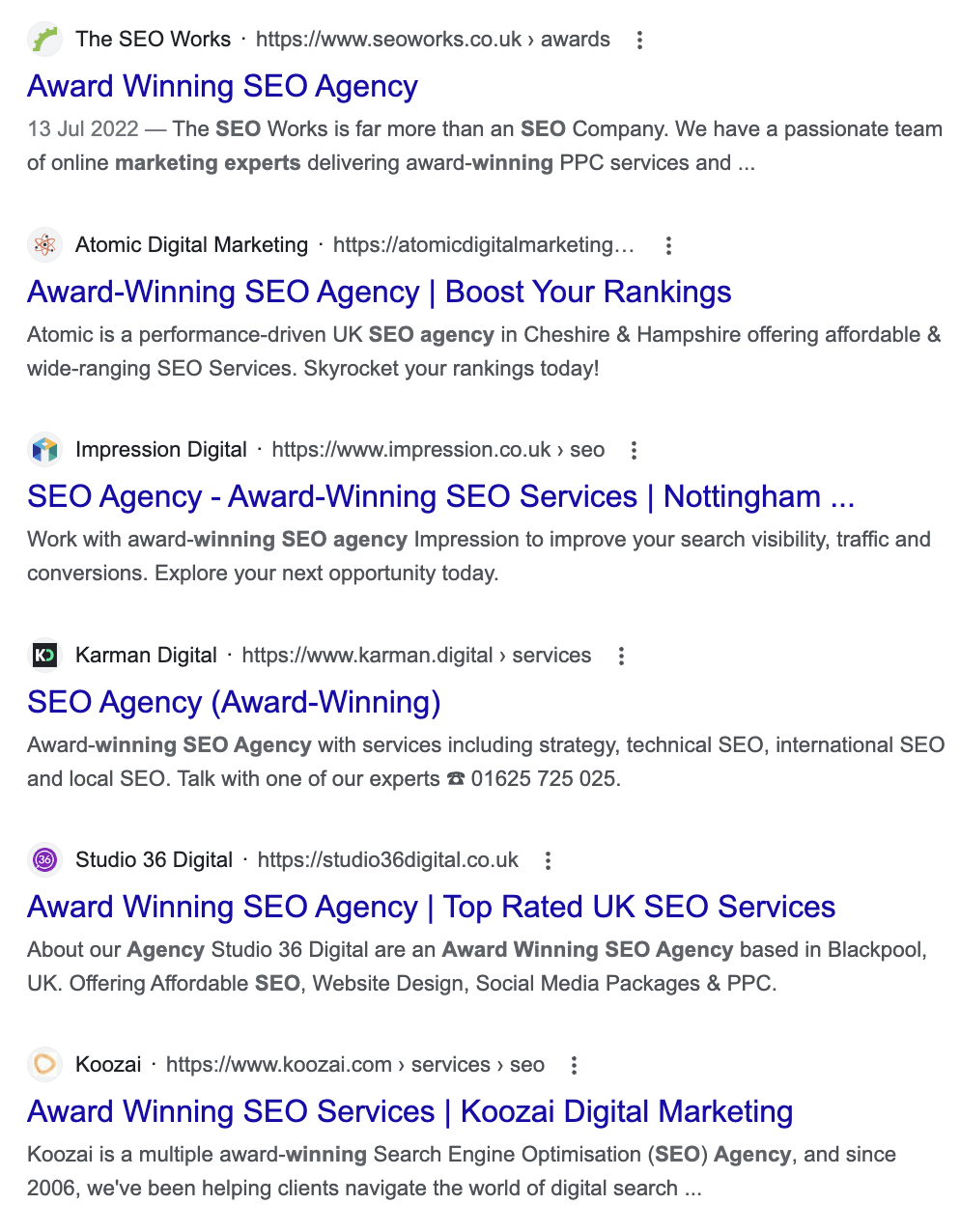
Be aware of the “we’re a Google Partner” line
In a similar way that the award-winning agency has become a bit of a cliche, there are also some unscrupulous agencies that will add Google Partner images and badges to their websites.
They do this to look more impressive. Here’s an example of someone complaining about this issue on a support thread.
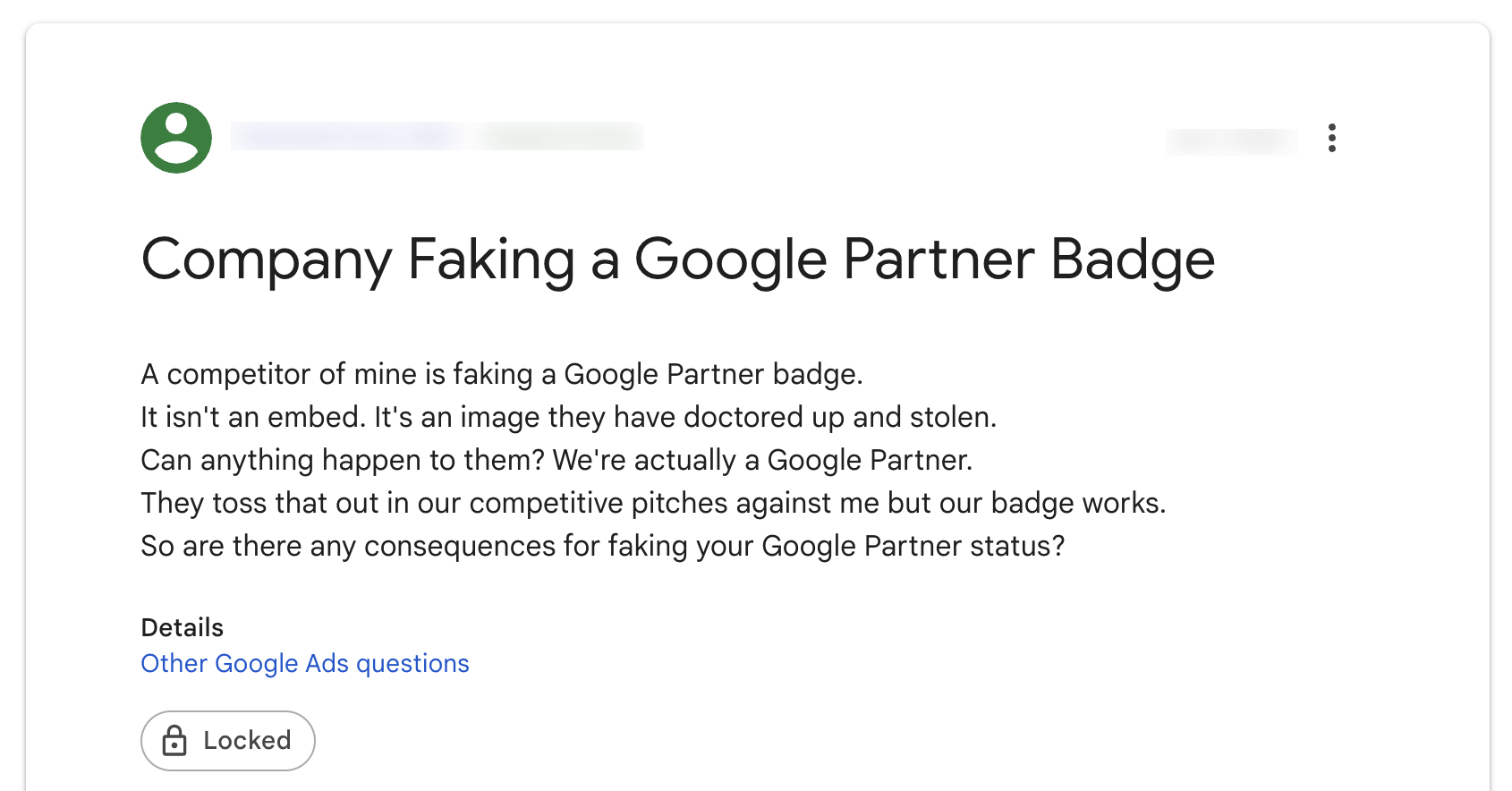
Sidenote.
A Google Partner is an approved advertising agency or third party that manages Google Ads accounts on behalf of other brands or businesses. Google Partner status is concerned more with PPC and is not an endorsement of an agency’s SEO services.
If you are unsure of an agency’s status, always check beforehand to confirm if it is legitimate using this directory.
Ask what SEO tools they use
They say you can tell a lot about a person by the company they keep—in SEO, you can say the same about the tools an agency uses.
It’s worth asking what SEO tools an agency has. If you choose to work with the agency, these tools will be your data sources.
SEO tools can vary in price—so by asking this question, you can get an idea of how much it spends.
For example, if it is using an enterprise SEO tool, then it’s probably clear from this that it is serious about SEO, and cash flow isn’t an issue for it.
On the other hand, if it is using a tool you know you can use for free, or fairly cheaply, and you get the impression it lacks expertise—this could be a potential red flag.
Ask about budgets
When it comes to budgets, you will typically need at least a four-figure monthly budget to work with a reputable SEO agency.
The reality is that if you have a smaller budget for SEO, then it may be worth working with an SEO consultant instead.
The reason for this is that agencies typically prioritize their highest-paying clients—because they mean the most to their business.
Ask if they outsource
When I started my career over 10 years ago, outsourcing was fairly rare in agency land.
But 10 years later, it’s now more common and something that even the big media agencies do to reduce costs.
When you think of outsourcing, it generally has negative connotations, but it can also be positive. Outsourcing can work for everyone if an agency has the right processes and training in place.
The bottom line here is to ensure that you are happy with the quality of the work.
Ask to see the SEO team
Agencies usually get the sales teams to do most of the work in the pitch stages, as that’s their specialty.
But as a prospective client, it’s worth remembering that the sales team won’t be the people working on the account with you.
Ask to see the SEO team members, and judge whether you think they will be a good fit with your business. A good team should act as an extension of your own business.
You don’t have to interrogate each member of the SEO team, asking about their experience. But you’ll probably be able to feel if the team is experienced or not just with a quick chat.
Once you have established that it’s a team you want to work with, it’s worth asking how many hours of senior SEO experience you will get on the account.
The agency is unlikely to refuse any of your requests early on since they will try their hardest to win you over as a client.
This is the best time to ask all your questions, get answers, and learn about the necessary details added to the contract.
Get testimonials
Sometimes, the best way to understand what an agency is like is to talk to some of its other clients.
Ask for testimonials from the agency’s other clients and, if possible, for a phone or video call. You’ll get much more information this way than from a forwarded email saying how great the agency is.
Case studies
Most agencies have a bunch of case studies on their websites about how they got a 10X ROI for a client they worked with. It’s a good idea to read these carefully—these are usually the best examples of their work. It will show you what they are capable of.
Final thoughts
SEO agencies are there to make your life easier, enabling you to spend more time focusing on your business. They will suit many businesses out there, but not all.
If your business can’t support a four-figure monthly retainer fee, then an agency is probably not right for you.
Lastly, don’t be afraid to ask lots of questions (and get answers) before you sign on the dotted line.
Got more questions? Ping me on Twitter. 🙂
SEO
HARO Has Been Dead for a While
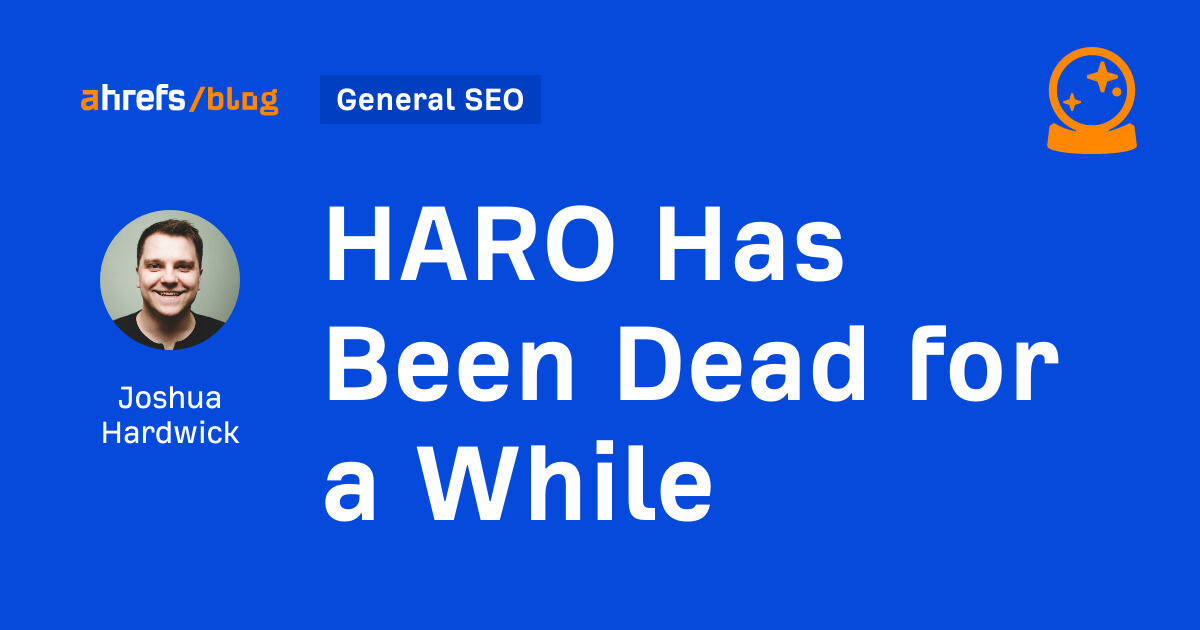
I know nothing about the new tool. I haven’t tried it. But after trying to use HARO recently, I can’t say I’m surprised or saddened by its death. It’s been a walking corpse for a while.
I used HARO way back in the day to build links. It worked. But a couple of months ago, I experienced the platform from the other side when I decided to try to source some “expert” insights for our posts.
After just a few minutes of work, I got hundreds of pitches:
So, I grabbed a cup of coffee and began to work through them. It didn’t take long before I lost the will to live. Every other pitch seemed like nothing more than lazy AI-generated nonsense from someone who definitely wasn’t an expert.
Here’s one of them:
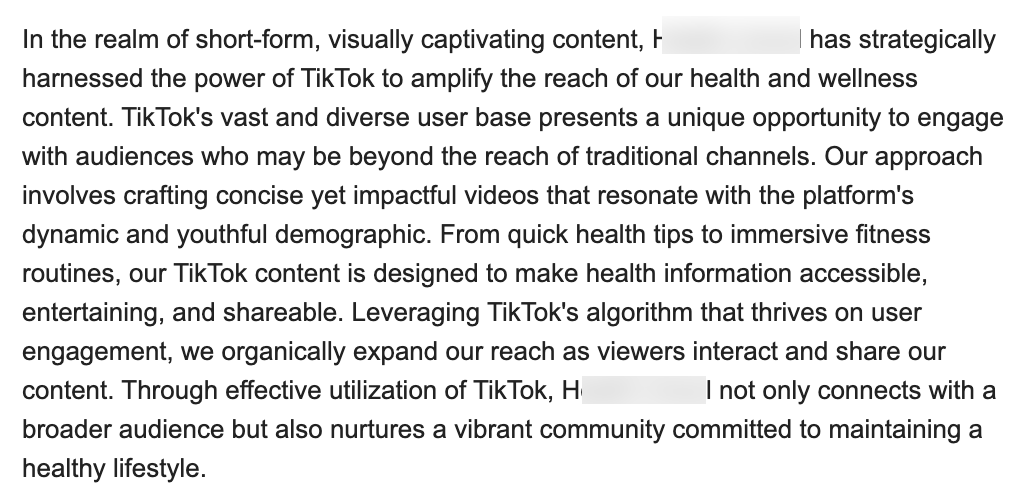

Seriously. Who writes like that? I’m a self-confessed dullard (any fellow Dull Men’s Club members here?), and even I’m not that dull…
I don’t think I looked through more than 30-40 of the responses. I just couldn’t bring myself to do it. It felt like having a conversation with ChatGPT… and not a very good one!
Despite only reviewing a few dozen of the many pitches I received, one stood out to me:


Believe it or not, this response came from a past client of mine who runs an SEO agency in the UK. Given how knowledgeable and experienced he is (he actually taught me a lot about SEO back in the day when I used to hassle him with questions on Skype), this pitch rang alarm bells for two reasons:
- I truly doubt he spends his time replying to HARO queries
- I know for a fact he’s no fan of Neil Patel (sorry, Neil, but I’m sure you’re aware of your reputation at this point!)
So… I decided to confront him 😉
Here’s what he said:
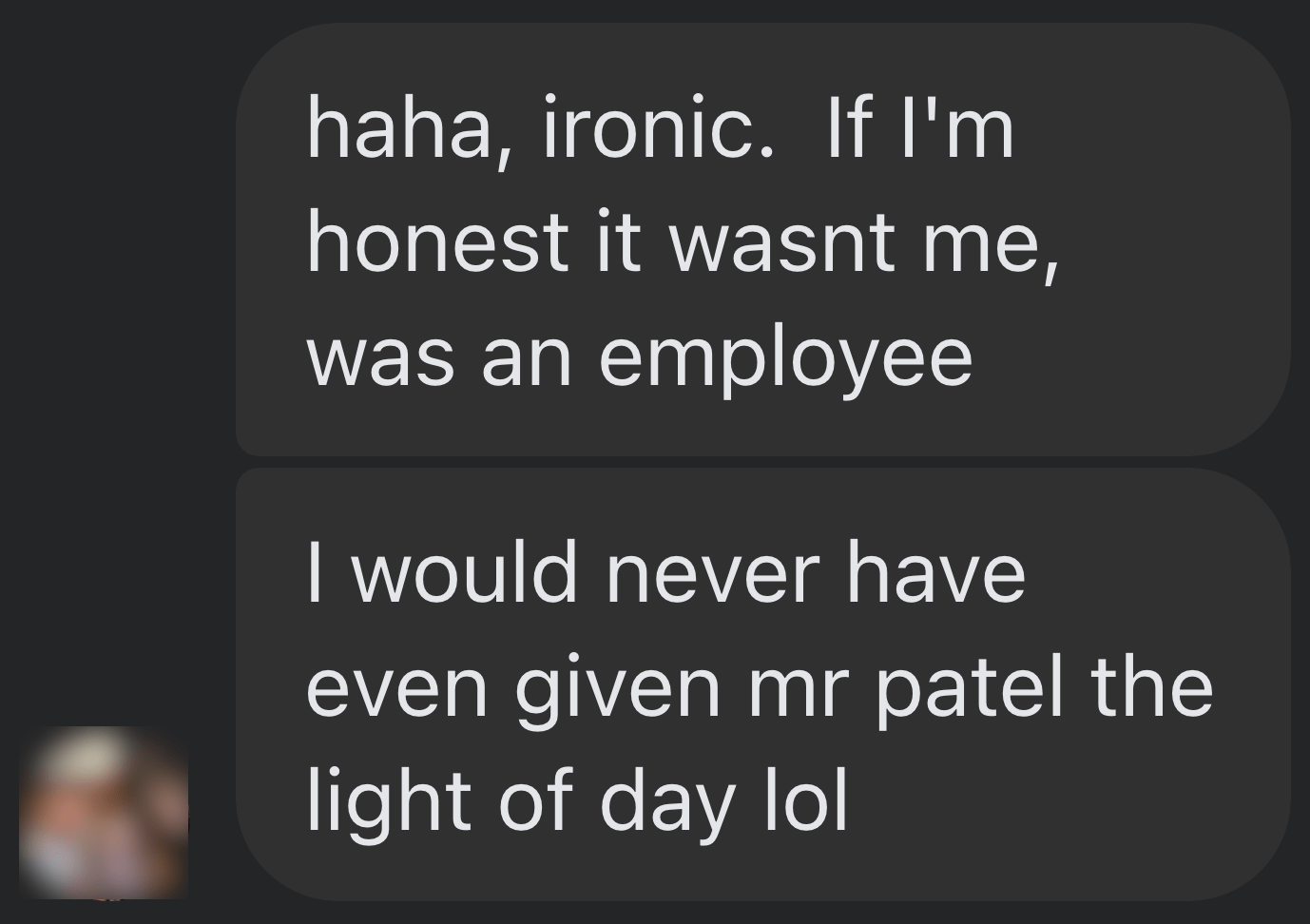

Shocker.
I pressed him for more details:
I’m getting a really good deal and paying per link rather than the typical £xxxx per month for X number of pitches. […] The responses as you’ve seen are not ideal but that’s a risk I’m prepared to take as realistically I dont have the time to do it myself. He’s not native english, but I have had to have a word with him a few times about clearly using AI. On the low cost ones I don’t care but on authority sites it needs to be more refined.
I think this pretty much sums up the state of HARO before its death. Most “pitches” were just AI answers from SEOs trying to build links for their clients.
Don’t get me wrong. I’m not throwing shade here. I know that good links are hard to come by, so you have to do what works. And the reality is that HARO did work. Just look at the example below. You can tell from the anchor and surrounding text in Ahrefs that these links were almost certainly built with HARO:
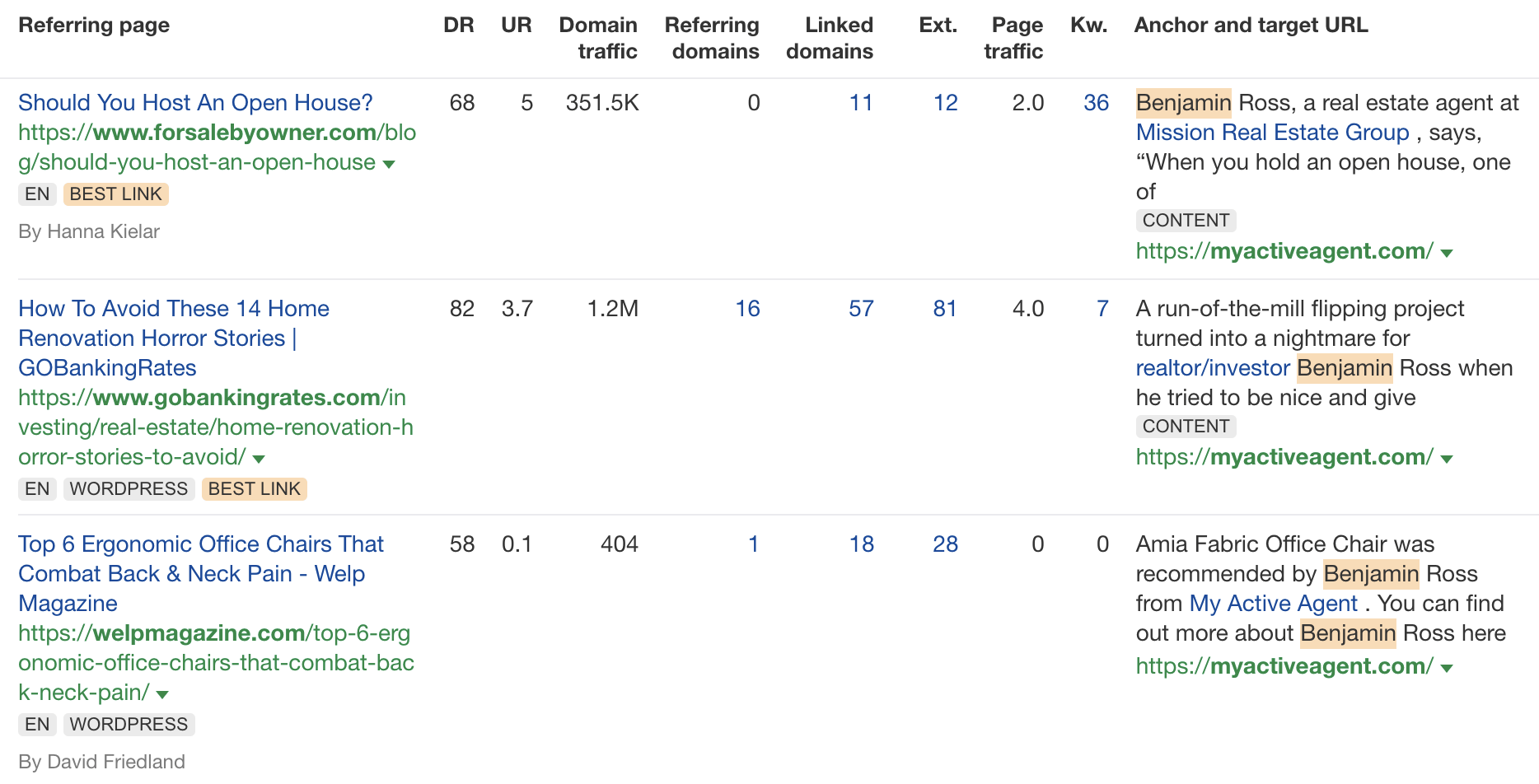

But this was the problem. HARO worked so well back in the day that it was only a matter of time before spammers and the #scale crew ruined it for everyone. That’s what happened, and now HARO is no more. So…
If you’re a link builder, I think it’s time to admit that HARO link building is dead and move on.
No tactic works well forever. It’s the law of sh**ty clickthroughs. This is why you don’t see SEOs having huge success with tactics like broken link building anymore. They’ve moved on to more innovative tactics or, dare I say it, are just buying links.
Sidenote.
Talking of buying links, here’s something to ponder: if Connectively charges for pitches, are links built through those pitches technically paid? If so, do they violate Google’s spam policies? It’s a murky old world this SEO lark, eh?
If you’re a journalist, Connectively might be worth a shot. But with experts being charged for pitches, you probably won’t get as many responses. That might be a good thing. You might get less spam. Or you might just get spammed by SEOs with deep pockets. The jury’s out for now.
My advice? Look for alternative methods like finding and reaching out to experts directly. You can easily use tools like Content Explorer to find folks who’ve written lots of content about the topic and are likely to be experts.
For example, if you look for content with “backlinks” in the title and go to the Authors tab, you might see a familiar name. 😉
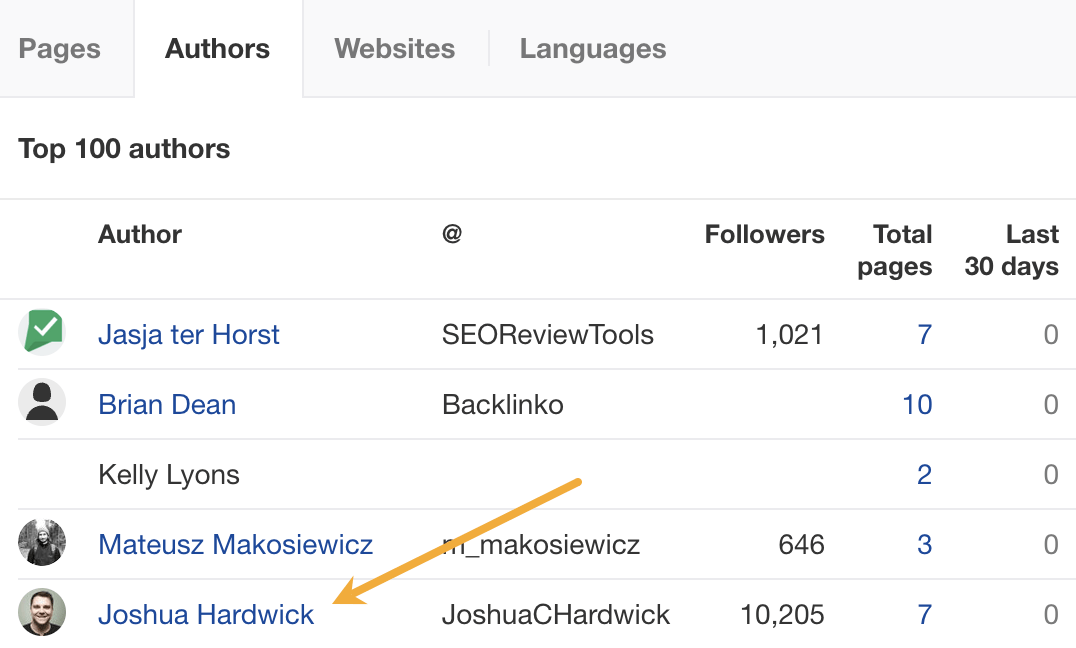

I don’t know if I’d call myself an expert, but I’d be happy to give you a quote if you reached out on social media or emailed me (here’s how to find my email address).
Alternatively, you can bait your audience into giving you their insights on social media. I did this recently with a poll on X and included many of the responses in my guide to toxic backlinks.
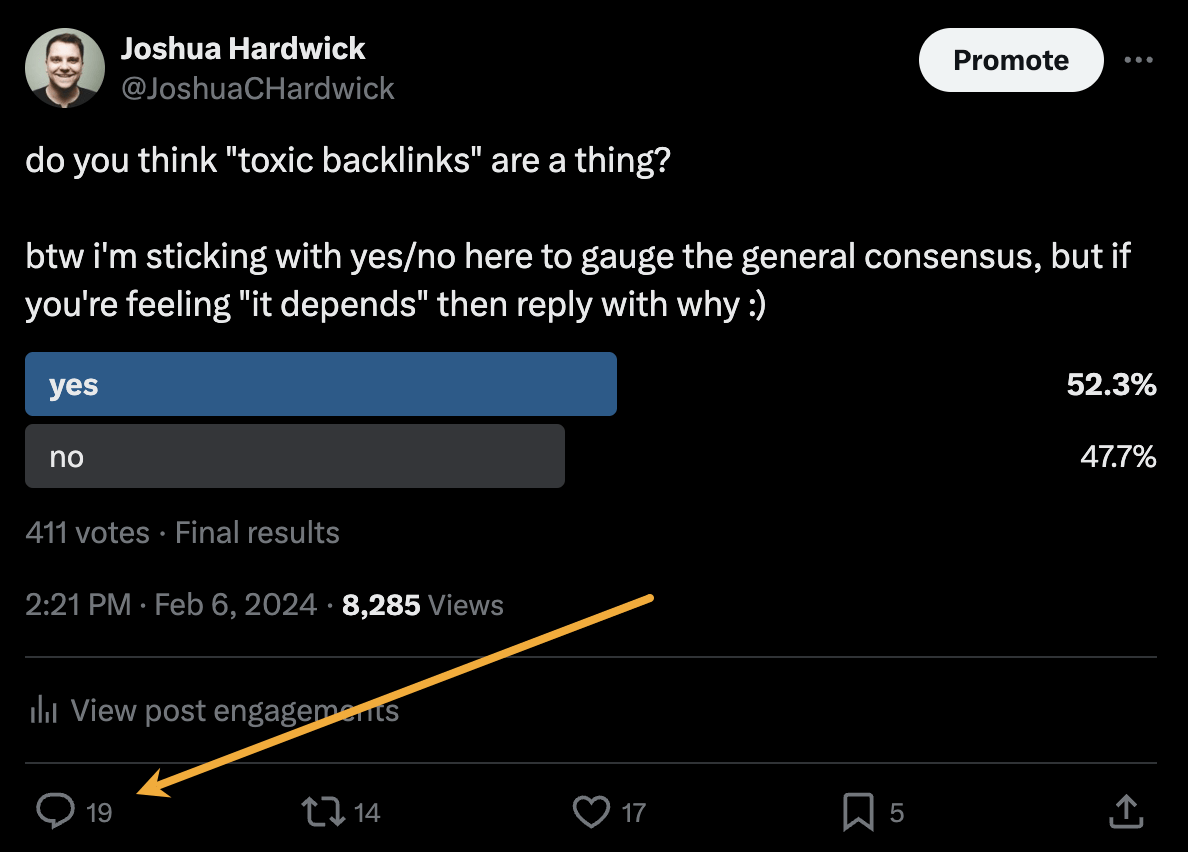

Either of these options is quicker than using HARO because you don’t have to sift through hundreds of responses looking for a needle in a haystack. If you disagree with me and still love HARO, feel free to tell me why on X 😉
SEO
Google Clarifies Vacation Rental Structured Data

Google’s structured data documentation for vacation rentals was recently updated to require more specific data in a change that is more of a clarification than it is a change in requirements. This change was made without any formal announcement or notation in the developer pages changelog.
Vacation Rentals Structured Data
These specific structured data types makes vacation rental information eligible for rich results that are specific to these kinds of rentals. However it’s not available to all websites. Vacation rental owners are required to be connected to a Google Technical Account Manager and have access to the Google Hotel Center platform.
VacationRental Structured Data Type Definitions
The primary changes were made to the structured data property type definitions where Google defines what the required and recommended property types are.
The changes to the documentation is in the section governing the Recommended properties and represents a clarification of the recommendations rather than a change in what Google requires.
The primary changes were made to the structured data type definitions where Google defines what the required and recommended property types are.
The changes to the documentation is in the section governing the Recommended properties and represents a clarification of the recommendations rather than a change in what Google requires.
Address Schema.org property
This is a subtle change but it’s important because it now represents a recommendation that requires more precise data.
This is what was recommended before:
“streetAddress”: “1600 Amphitheatre Pkwy.”
This is what it now recommends:
“streetAddress”: “1600 Amphitheatre Pkwy, Unit 6E”
Address Property Change Description
The most substantial change is to the description of what the “address” property is, becoming more descriptive and precise about what is recommended.
The description before the change:
PostalAddress
Information about the street address of the listing. Include all properties that apply to your country.
The description after the change:
PostalAddress
The full, physical location of the vacation rental.
Provide the street address, city, state or region, and postal code for the vacation rental. If applicable, provide the unit or apartment number.
Note that P.O. boxes or other mailing-only addresses are not considered full, physical addresses.
This is repeated in the section for address.streetAddress property
This is what it recommended before:
address.streetAddress Text
The full street address of your vacation listing.
And this is what it recommends now:
address.streetAddress Text
The full street address of your vacation listing, including the unit or apartment number if applicable.
Clarification And Not A Change
Although these updates don’t represent a change in Google’s guidance they are nonetheless important because they offer clearer guidance with less ambiguity as to what is recommended.
Read the updated structured data guidance:
Vacation rental (VacationRental) structured data
Featured Image by Shutterstock/New Africa
SEO
Google On Hyphens In Domain Names
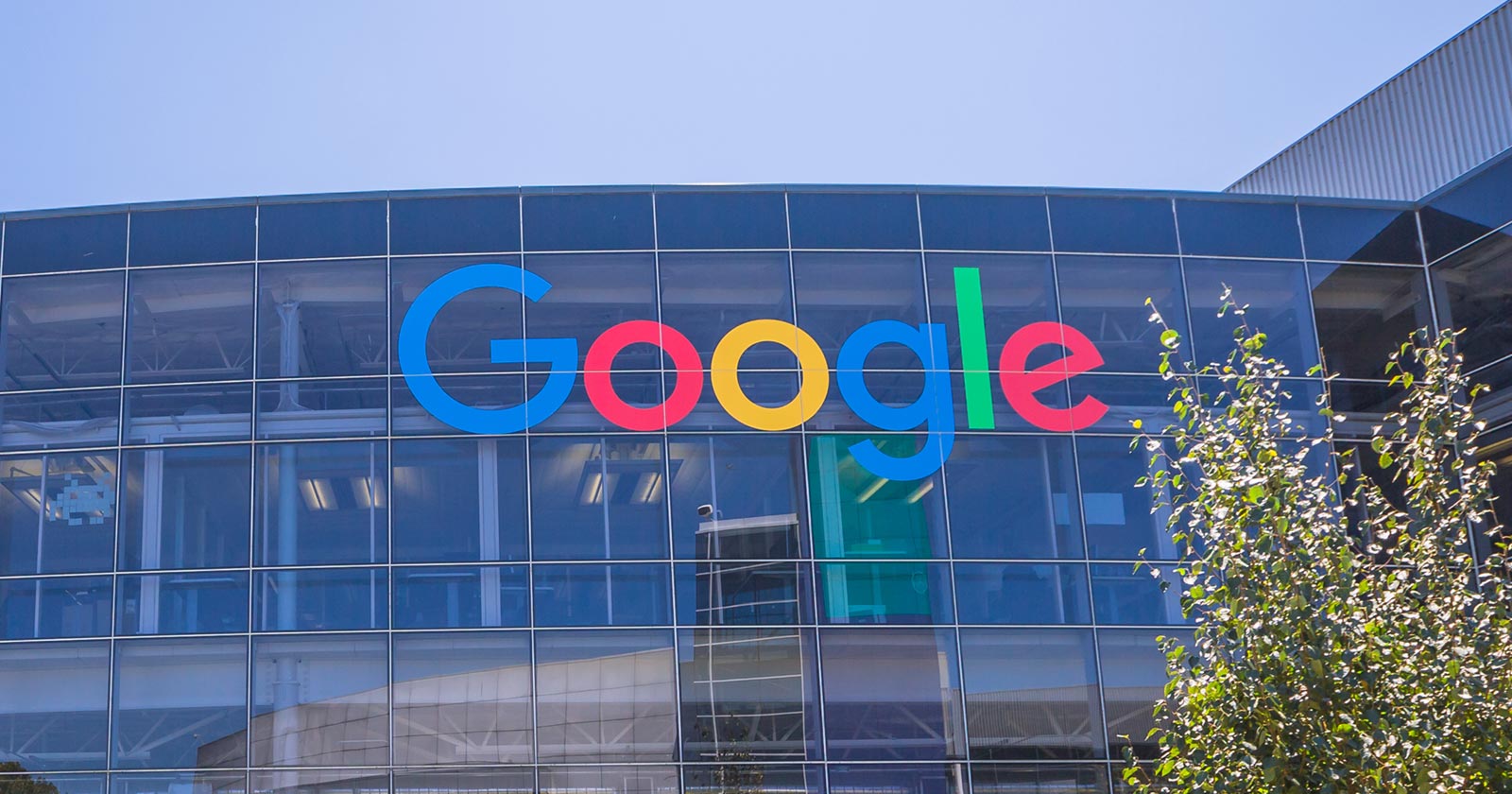
Google’s John Mueller answered a question on Reddit about why people don’t use hyphens with domains and if there was something to be concerned about that they were missing.
Domain Names With Hyphens For SEO
I’ve been working online for 25 years and I remember when using hyphens in domains was something that affiliates did for SEO when Google was still influenced by keywords in the domain, URL, and basically keywords anywhere on the webpage. It wasn’t something that everyone did, it was mainly something that was popular with some affiliate marketers.
Another reason for choosing domain names with keywords in them was that site visitors tended to convert at a higher rate because the keywords essentially prequalified the site visitor. I know from experience how useful two-keyword domains (and one word domain names) are for conversions, as long as they didn’t have hyphens in them.
A consideration that caused hyphenated domain names to fall out of favor is that they have an untrustworthy appearance and that can work against conversion rates because trustworthiness is an important factor for conversions.
Lastly, hyphenated domain names look tacky. Why go with tacky when a brandable domain is easier for building trust and conversions?
Domain Name Question Asked On Reddit
This is the question asked on Reddit:
“Why don’t people use a lot of domains with hyphens? Is there something concerning about it? I understand when you tell it out loud people make miss hyphen in search.”
And this is Mueller’s response:
“It used to be that domain names with a lot of hyphens were considered (by users? or by SEOs assuming users would? it’s been a while) to be less serious – since they could imply that you weren’t able to get the domain name with fewer hyphens. Nowadays there are a lot of top-level-domains so it’s less of a thing.
My main recommendation is to pick something for the long run (assuming that’s what you’re aiming for), and not to be overly keyword focused (because life is too short to box yourself into a corner – make good things, course-correct over time, don’t let a domain-name limit what you do online). The web is full of awkward, keyword-focused short-lived low-effort takes made for SEO — make something truly awesome that people will ask for by name. If that takes a hyphen in the name – go for it.”
Pick A Domain Name That Can Grow
Mueller is right about picking a domain name that won’t lock your site into one topic. When a site grows in popularity the natural growth path is to expand the range of topics the site coves. But that’s hard to do when the domain is locked into one rigid keyword phrase. That’s one of the downsides of picking a “Best + keyword + reviews” domain, too. Those domains can’t grow bigger and look tacky, too.
That’s why I’ve always recommended brandable domains that are memorable and encourage trust in some way.
Read the post on Reddit:
Read Mueller’s response here.
Featured Image by Shutterstock/Benny Marty
-

 PPC7 days ago
PPC7 days agoA History of Google AdWords and Google Ads: Revolutionizing Digital Advertising & Marketing Since 2000
-

 WORDPRESS6 days ago
WORDPRESS6 days agoTurkish startup ikas attracts $20M for its e-commerce platform designed for small businesses
-

 MARKETING6 days ago
MARKETING6 days agoRoundel Media Studio: What to Expect From Target’s New Self-Service Platform
-

 SEO5 days ago
SEO5 days agoGoogle Limits News Links In California Over Proposed ‘Link Tax’ Law
-

 MARKETING6 days ago
MARKETING6 days agoUnlocking the Power of AI Transcription for Enhanced Content Marketing Strategies
-
SEARCHENGINES5 days ago
Daily Search Forum Recap: April 12, 2024
-

 SEARCHENGINES6 days ago
SEARCHENGINES6 days agoGoogle Search Results Can Be Harmful & Dangerous In Some Cases
-

 SEO4 days ago
SEO4 days ago10 Paid Search & PPC Planning Best Practices







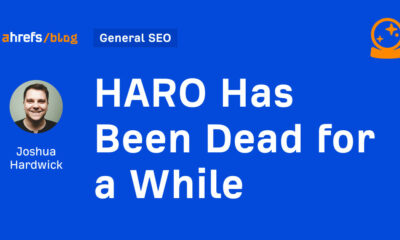







You must be logged in to post a comment Login